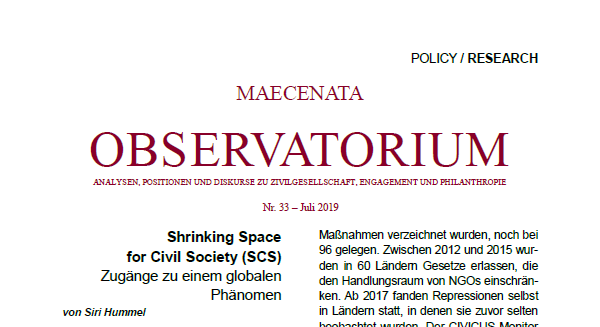Religious Communities and Civil Society – A Legal Perspective
Observatorium 15 | 01.09.2017 | The role of religious communities in European society is undergoing fundamental changes. Faced with a growing secularization of citizens, societies and states, as much as by the influx of Muslim communities with a strong religious adherence, they are rethinking their traditional role, while nonbelievers are challenging their privileges in law and governmental practice, while continuing to appeal to religious leaders as moral authorities and guarantors of human rights in the face of government harassment. In short, religious communities are drawing much nearer to the concept and reality of civil society than they themselves would have imagined even at the end of the 20th century. Undoubtedly, this will influence the concept of civil society as much as it will these communities. The Maecenata Institute for Philanthropy and Civil Society is currently conducting a large-scale study on this subject (see Observatorium no. 6 for an outline). The author of this paper has conducted a more detailed survey of the legal aspects in the course of this research project. This paper is a short summary of his findings. (Rupert Graf Strachwitz)
I. International Legal Principles Regarding the Relations between the State and Religious Communities
The relations between the European states and the religious communities that have members in these states have developed in very diverse ways, due to the states’ particular social and legal history. An important event in all countries however, was the introduction of freedom of religion in the 19th or the 20th century.
The European Convention on Human Rights (ECHR) of 1950 introduced a common set of principles of human rights, including the freedom of religion (Art. 9) for both individuals and religious organisations, which is in force in all European countries. These countries are bound by these principles in their own legislation and policy.1 According to section 2 of Art. 9 ECHR, this freedom may only be limited by law, and only as far as is necessary in a democratic society in the interest of public security, for the protection of public order, health or good morals or for the protection of the rights and freedom of others.
The European Court on Human Rights allows the states much freedom to take their own traditions, views, social and legal system into account when regulating on religious organisations (the so-called margin of appreciation). However, freedom of religion presupposes a degree of separation between religious organisations and the state. It maintains that the state should not meddle in internal affairs of religious organisations and religious organisations should not meddle in politics. Furthermore, the state should be neutral regarding religion in the sense that it should not pass judgement on religious doctrine. Also, according to the ECHR, all religious organisations are entitled to legal personality.2 Thanks to legal personality the organisations may buy or rent real estate for a prayer/worship building, appoint a minister, priest, imam etc. and receive donations in their own name. Without legal personality this would be much more complicated.
II. Relations between the States and Religious Organisations and their Legal Personality
Five models of relations between the state and religious organisations exist in the countries bound by the ECHR. In many countries more than one model is applicable.3
1) The State Church: A state church means that a particular religious organisation enjoys a special legal status as a national religion, combined with (mostly) financial support of the organisation and (some) formal influence of the Church and/or influence by the government on the internal organisation of the Church. A state-church has a public-law character. A state church status may but does not necessarily entail payment of its clergy by the government. This payment exists in Greece and Turkey, but e.g. not in England and Scotland. State churches usually act in consensus with the state.
2) The state may accord one or more religious organisation a preferred position, by law, decree or agreement, usually by providing it with legal personality under public law. Such preferred religious organisations exist in Austria, Belgium, France (in AlsaceLorraine only), Germany, Greece (regarding some religious communities based on old treaties), Israel (as a ‘Jewish’ state), Italy and Poland (regarding the Roman Catholic Church, which is however a legal person under private law). In Belgium the clergy of recognized religious organisations of recognized religious streams (which includes Islam and humanism) is paid by government.
3) The state may accord recognition to individual religious organisations as legal persons under private law, by law, decree or agreement. The state sets its conditions for this recognition, which usually leaves some discretionary power to the state. This model is used in Bosnia and Herzegovina, England (by law), France (association cultuelle), Greece, Israel, Italy, Poland, Sweden (registration), Turkey (for some older nonMuslim communities), and Ukraine. From a human rights perspective it is important that this recognition is not a discretionary favour accorded by the government.
4) The state attributes legal personality under private law to religious organisations, but does not entertain a special relationship with any one of them. The state does not recognize an individual religious organisation, but the general law provides all of them with a freedom to operate. This is the system of the Netherlands.
5) The state observes a strict separation between the state and religious organisations. Religious organisations are considered equal to associations, the state considering religion a private matter of its citizens. The state sees itself as completely secular; the absence of religion in public places is seen as essential. This is the laïcité model of France. Religious associations may ask for recognition as normal (cultural) associations by depositing their statutes with a regional authority or be recognized as an association cultuelle by the Council of State.
(Two further models are: 1), the theocratic model, in which a specific religion is the only one tolerated in the country (Vatican City), and 2), the atheist model, in which the state does not allow religion (North Korea).) In all countries bound by the ECHR, religious organisations which do not wish or do not receive recognition as such from the government, may make use of appropriate secular legal forms to obtain legal personality, most commonly an association or a foundation, in England and Scotland a charitable trust or a corporation. They may also use a contractual form to operate in society.
III. Religious Organisations, their Societal Activities, and Recent Developments4
After the end of World War I, many European states developed a welfare state system. Health care and other public services, which in the past had largely been provided by religious organisations, became state activities or activities controlled by the state through subsidies and/or contracts. Towards the end of the 20th century, when the state in many countries drew back from these areas in the wake of the economic crisis, this did not automatically restore their former position to the religious organisations. Recently, two other important common developments regarding the relationship between the state and religious organisations may be observed:
- In the last century, religious adherence of the citizens has diminished, particularly among (traditional) Christians and less so among Muslims.
- As the societal strength of religious organisations weakens, they tend to operate less as part of an overall governmental system and more like non-governmental i.e. civil society organisations; the state approach to religious organisations increasingly resembles one towards a neutral facilitator.5
Regarding the possibilities for religious organisations to perform societal activities and to be subsidized, governments, under the terms of the ECHR, should maintain the principle of non-discrimination. Non-religious, faithbased, and religious organisations should be given the same opportunities to enter into government contracts and receive subsidies for societal activities. 6 Differences in treatment should be based on reasonable and objective grounds. E.g., in many cases, one condition for subsidies is that the service provided be available to everybody. Religious organisations provide opportunities for civic engagement, support and operate numerous volunteer activities, provide health care, social care and educational services, establish and maintain cemeteries, and cultural heritage sites (churches etc.), provide development aid, help refugees, are active in micro-credit, print books and operate bookshops and other media outlets, and entertain commercial activities such as breweries and guesthouses. They generally provide these services not only for their own members but for the public at large. (Immigrant) churches often help with the integration of immigrants into their new society. Increasingly, some religious organisations also assume an advocacy role. However, in as far as the clergy and/or other officers of religious organisations receive their salaries from government, this makes their civil society role more problematic. Besides, they are called upon to be active in a specific category of social activities by assisting the government in guaranteeing the freedom of religion of persons that are confined to penitentiary institutions or who participate in military service. Chaplains, Ministers, Rabbis, Imams etc. perform religious services and deliver pastoral care in these institutions at the cost of the government. In countries with a state church or with preferred religious organisations the services mentioned here can usually only be provided by these types of religious organisations. In general, religious organisations and their donors receive the same tax treatment as other charitable organisations do. Thus, in their functioning in society, religious organisations can well be compared to civil society organisations.
[1] See also Art. 18 of the Universal Declaration of Human Rights of the United Nations of 1948.
[2] See e.g.: ECHR 16 December 1997, nr. 25528/94 (Canea Catholic Church vs. Greece).
[3] The research-paper that forms the basis for this contribution covers the following countries: Austria, Belgium, Bosnia-Herzegovina, England and Wales, France, Germany, Greece, Israel, Italy, The Netherlands, Poland, Sweden, Turkey, Ukraine. Israel and Turkey are not part of Europe but have many links with Europe.
[4] See also: Inger Dübeck, Frans Ole Overgaard (red.), Social welfare, religious organisations and the State, Milano Giuffree Editore, 2003.
[5] Compare S. Ferrari, Separation of church and state in contemporary European society, Journal of church and state 1988, p. 533 ff, here p. 537-538.
[6] See Roland Pierik & Wibren van der Burg, What is state neutrality?, Ratio Juris 2014, p. 496 ff.







